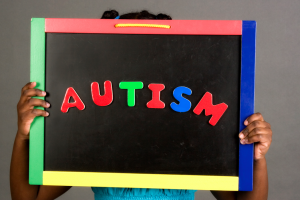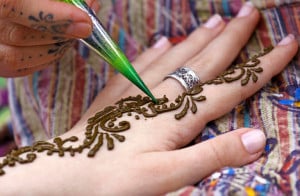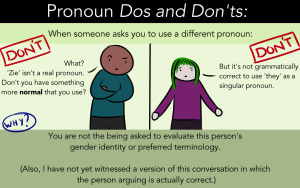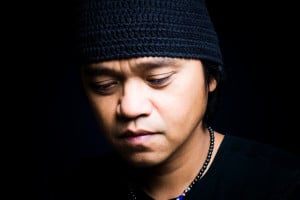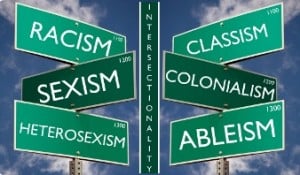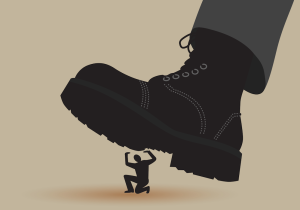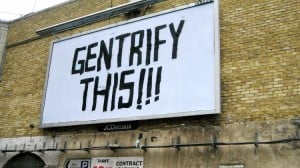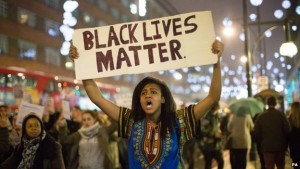
Source: Salvage
Originally published on Grown Up Truth and republished here with the author’s permission.
With the simple profession of the phrase “Black Lives Matter” gaining steam, are you willing to take an undeniable position – both political and tangible – that shows that truth in action?
In the two years since its inception, the phrase “Black Lives Matter” has taken on a life of its own.
What began as a rallying cry for mobilization against anti-Black racism has since blossomed into a transnational organization with 26 growing chapters and a history-in-the-making movement for reparations, rights, and justice.
Though we have a long way to go, we’ve already made progress.
Some still have issues with the statement’s necessity as a slogan, still others have gone so far as to frame the revolution itself as a hate movement in disguise.
But more and more have embraced the basic idea that it is necessary to make the now-famous proclamation as is – without the overpowering word “all” instead of Black at the forefront (see the many, many reasons why that is inappropriate).
Now that a larger majority of us can agree on the statement’s necessity, we can delve deeper into the question “So, Black Lives Matter – Now what?”
Well, inside the statement “Black Lives Matter” is an expectation of action and solidarity, and it’s time for a radical shift in how we all demand this embedded expectation.
For those who haven’t already, let’s move beyond just saying it, into truly living it.
‘Black Lives Matter’ Has a Built-In Call to Action
In this quieter time of managing less derailment, there is finally space to acknowledge the reality of what is being said: “Black Lives Matter” is a shout for urgent acknowledgement and tangible life support.
Imagine you’ve just finished a Saturday afternoon visit full of sweet conversation with your neighbors where you end by telling them how much you care about them and their family.
Would you then ignore their requests for help later that evening when they come urgently knocking at your door to say their house is on fire? I should hope not.
We also need you to not ignore the demand within this now famous phrase.
If you have a person in your life or family whose potential truly matters to you, the world will know. From general protection, to the meeting of basic needs, to ensuring their healthy growth and intact life potential – you would be keen on noticing each and every interruption!
And, if these things happen (or don’t happen) on your watch, people would probably call you out on a certain hypocrisy, or at the very least note that you weren’t telling the whole truth when you professed to care.
Similarly, if Black Lives really do Matter, it’s not enough to simply share the sentiment, one (and furthermore, society) must turn this belief into action.
‘It’s Not My Fault, So Why Is It my Problem?’
Why is it necessary to break down the true meaning of Black Lives Matter?
Well, oddly enough, it is worth noting that Black life does not seem to naturally fall into the category of shared, worthy social responsibility (or— wait—did I miss it when the White House and hundreds of Congress members tweeted “Black Lives Matter?”).
On the contrary, there is a seemingly constant need to convince others that Black life is a worthy “cause” and – more specifically – that each and every Black life matters.
So why is this?
It’s everyone’s responsibility to make sure that Black lives look and feel like they matter because everyone benefits, temporarily, when they distance themselves from Black Life.
In 2015, racism is a simple equation: Black + anything else = that thing will immediately be looked down upon and questioned. Period.
Think about it for a minute: Unarmed Black person was gunned down? Hmm, let’s wait until the police report comes out to be sure they didn’t do something to deserve it.
Want to be called the Best Tennis Player in the world by everyone? Don’t be (a) Black (tennis phenom starting at age 11).
Make your way to the “highest office in the land?” Be Black and all of a sudden, doubters come out of the woodworks and threaten your life far too regularly for it to really be about “a lack of political experience” or rampant birthright and religious misconceptions.
This is the nature of the racial caste system that was created in the formation of the Western world.
Put another way, we actively designed a social hierarchy when we formalized a mass, efficient, dehumanizing system for owning Black people as property.
And as a result, Black people are still at the bottom.
While many may say that slavery is too old or distant from our current societal format to still be talking about in 2015, the truth of the matter is that our whole world come with the context and history – this particular one is just uncomfortable to talk about.
The State Won’t Save Us
In most democratic countries that have cultural or social issues affecting large groups, the responsibility of handling and supporting any one group is placed on the government.
Rightly so, in some senses, how can any one person right a social wrong that impacts thousands if not millions of people?
But in the US (and most other countries), as the #NotMyConstitution movement points out, our government has done a particularly #fantasticallyhorrible job of never intending to support Black Life in the first place.
If you didn’t notice, they created legal documents meant for “all people” while literally owning Black ones as slaves. They pretty clearly weren’t pressed to include Black people in the dream of what freedom looks like and what “liberty and justice for all” tangibly, legally means.
Say you eat cow daily and build an economy and society on this cow industry. If you then write and attempt to implement a manifesto that says all animals with legs should have a right to life and freedom (but keep eating cow as if you never said that), something is amiss, to say the least. You should either stop eating cow or at least publicly apologize for the hypocrisy you lived out.
In this vein, The Bill of Rights and Constitutional Amendments are simply bandaids for what is a gaping wound of disregard and ignorance to the inherent value of Black Life.
The founding documents were written to serve the freedoms and dreams of a particular group of (rich, white, male, property-owning) people. They may not have said this exactly, but it’s what they didn’t say – and the lack of reparations, let’s be honest – that has allowed Black life to stay at the bottom of the societal totem pole.
When you wrong an entire group of people collectively for so long and so horrendously, and then don’t even think about saying #OurBad #WeTotallyOweYou until someone refuses to move from a seat the front of a bus, what does that make you besides someone (or some government) not worth trusting or believing?
Thus, the United States government cannot be trusted to fix itself and implement real support for Black Life.
Rather, it falls in the hands of the collective masses to care about each other.
The government is only going to serve (all of) its people when (all of) its people make it abundantly clear that they won’t stand for anything less.
Caring Explicitly About Black Lives Radically Benefits All Lives
That said, we need a radical shift in how we show that we care about certain lives. To be clear, this is not simply or solely going to benefit Black Lives.
Rather, when you draw your attention to a root issue, everything is adjusted and ameliorated from the roots up – whether you’re talking about an old car with poor mileage or a young middle schooler who is disinterested and acts out in school.
If you address the fundamental problem – be it lack of oil that impacts how efficient the engine as a whole is, or the student’s insecurity around reading because their instruction was insufficient in their elementary years – the behavioral problems that manifest will be fixed if you draw attention to the root problem and fix it in context.
This, in fact, is what the word radical means – to grasp at the root.
We must each individually grasp at the root of how anti-Black racism shows up in our lives.
What can be done to Black Lives serves as the bottom bucket and standard of what can be done to All Lives.
Just think about that for a minute.
Acknowledgement of our deep, shared anti-Blackness will then spill over into our understanding of the worth of all life. Correspondingly, there will be a shift in how we’ll allow society to be structured.
Yes, You Have the Power to Stop Racism (And No, It Didn’t End in the 1950s)
Michelle Alexander puts it simply, in her 2012 book The New Jim Crow: Mass Incarceration in the Age of Colorblindness:
When we think of racism we think of Governor Wallace of Alabama blocking the schoolhouse door; we think of water hoses, lynchings, racial epithets, and ‘whites only’ signs. These images make it easy to forget that many wonderful, goodhearted white people who were generous to others, respectful of their neighbors, and even kind to their black maids, gardeners, or shoe shiners – and wished them well – nevertheless went to the polls and voted for racial segregation…
Our understanding of racism is therefore shaped by the most extreme expressions of individual bigotry, not by the way in which it functions naturally, almost invisibly (and sometimes with genuinely benign intent), when it is embedded in the structure of a social system.”
The work of undoing anti-Blackness in our world is embedded structural baggage that we cannot (and should not want to!) deny.
Unpacking this baggage cannot only occur in obvious and grandiose acts, but it must also show up in the minute sense, as it is an entire system of wrongdoing built upon itself.
When people advocate for colorblindness, change Black Lives Matter to All Lives Matter, or say “No Blacks, just a preference” on dating ads or home/rental listings (all variations of “I’m not racist, but here’s some racism”), what they’re really saying is that they don’t want to have to handle the extra baggage and do the extra work that comes along with making it clear that Black Lives Matter.
It’s much easier to see everyone as equal and theoretically “love everyone just the same.” But it’s worth saying plainly: Everyone has not systematically been treated just the same historically.
In reality, we are each individually responsible for making up for lost time. To truly grasp, believe, and live the painfully, obviously true statement “Black Lives Matter” is world-changing.
Indeed, it is the only way to stop reifying the insidious, codified practices that have kept Black Lives from mattering since they were first brought out of Africa to the Americas (and to the Middle East, East Asia, and Northern Europe, let’s not forget!).
So What Does the Call in Action Look Like?
Because there are already so many articles listing how to support this movement, instead of listing steps for you to take, I simply suggest taking an honest look at your life: your sphere of influence, your career, your media/entertainment, your neighborhood.
And ask yourself these questions to find out and self-implement the steps that are best for you to take in your life:
1. Am I around Black people much? If not, how are they kept out of spaces I’m in? Beware of intense rationalization.
2. Do the Black people around me feel valued? Do I know? Have I asked them? Do I care? If they are not valued, how are Black people devalued in the spaces I see them in?
3. How am I complicit in the activities of 1 and 2?
4. Where are all the Black people located in my life? Are they limited to one area or type of interaction?
5. In what ways do I make exceptions for the ways society treats Black people that I wouldn’t accept being done to me or other people I actually care about? (Yes, shade.)
6. What do I do that screams, “I value Black Life, no matter what?”
7. What is my personal front line and growth edge in terms of making it so that all Lives actually matter? In other words, the ever-uncomfortable: What am I (un)willing to give up?
We need to start by unlearning what we’ve internalized about Black Lives, which is that they are worthy of being both and only property or other (at both minimum and maximum) and that they don’t matter, or more specifically, only matter in a capitalist context and in exceptional #BlackExcellence form.
Whether someone is the next Obama, cancer-curer, or the next Trap Queen, there shouldn’t be a specific, inherent value on any one type of Black life, or any life for that matter – criminal/incarcerated, disabled/able-bodied, queer, trans, intelligent, socialist, light, dark, or otherwise.
I encourage you to dream up what it would look like for Black Lives (and then as a natural result, All Lives) to matter in this world because we’ve never actually known what that is like nor has there been a mass consensus and conversation on what that would be like.
In the end, in the midst of all the grief (or ambivalence), we must remember to dream. It is the only thing that will ever set us free.
[do_widget id=’text-101′]
Jay–Marie is a Black Boricuex Queerdo born and bred in the Yay (CA) . She is an educator, organizer, administrator, and artist who works from a foundational desire to \elevate/ Art, Masculine-Feminine-Genderless Divinity, and Blackness in the journey toward achieving liberation for Black (aka eventually all) people. Find her at @musicfreedomdreams on IG & @Jay_Marie on Twitter – she stay keepin it #allthewaycute.
Search our 3000+ articles!
Read our articles about:
Our online racial justice training
Used by hundreds of universities, non-profits, and businesses.
Click to learn more






